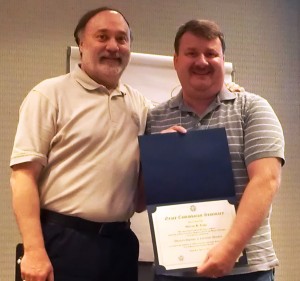Dear Brothers and Sisters in Christ,
 One of the more enigmatic questions posed by our understanding of the cosmos is this: Why is there something instead of nothing?
One of the more enigmatic questions posed by our understanding of the cosmos is this: Why is there something instead of nothing?
Some people might think this is a dumb question, but to many scientists, it is of major importance, along with two related questions: Why does matter exist at all? And given that it does exist, where did it come from?
The Bible’s first words inform us that God created the heavens and the earth. This fundamental revelation guided the children of Israel away from Egypt’s false gods toward the true Lord God of all creation. Through prophetic revelation, God taught Israel foundational truths in language they could understand. Those truths concerned his identity and the nature of his relationship with all of creation.
Genesis was not intended to be the last word about the inner workings of the cosmos. Modern scientific methods and tools help us research such details. However, the biblical revelation has not been superseded as a first word and starting point for this research. The biblical revelation presents theological/philosophical presuppositions that science cannot provide on its own. Grounded upon these presuppositions, scientific research concerning the cosmos can proceed in fruitful ways.
Of course, many scientists scoff at the biblical and Christian answer as to why there is a cosmos at all, considering it to be science fiction (with an emphasis on fiction). Now, I enjoy good science fiction, particularly the Star Trek series. Captains Kirk, Picard, Sisko and Janeway tackled all kinds of social and moral issues with a backdrop of all kinds of imaginative devices to beam them from one place to another, travel at warp-speed, eat and drink items synthesized from a machine and explore all kinds of life forms.
What makes Star Trek so good is that it has a real basis in science. You can read about it in the book The Physics of Star Trek, by theoretical physicist Dr. Lawrence M. Krauss. Krauss also wrote A Universe from Nothing: Why There is Something Rather Than Nothing. Krauss is one of several scientists who try to prove that every particle and force in the universe sprang into being from nothing, without God being part of the process. To reach this conclusion, Krauss theorizes three kinds of nothingness.
The first kind is a concept inherited from Greek thought, which Krauss refers to it as The nothingness of empty space. Today we know that this “nothingness” is not empty — rather it is teeming with energy and particles. We currently have the ability to detect about 6% of what is there. The remaining 94% we refer to as “dark matter” and “dark energy,” which are beyond the reach of our physical senses and scientific instruments. We can’t explain exactly what these features of the cosmos are or how they work. However, we know that they exist, based on their effect on what we can directly detect.
Krauss then refers to a second kind of nothingness, which he calls The nothing without space and time. His conjecture is that whole universes bubble up out of this kind of nothingness. Each bubble has its own space-time and simply pops into existence. But even if this is true, as Krauss notes, we are left wondering, where did this bubbling something come from?
Krauss’s third kind of nothingness is a more profound kind in which even the laws of physics are absent. He attempts to explain how this happens by saying that an infinite assembly of universes (what he calls the multiverse) exists in this nothingness. Each universe has its own randomly determined rules, particles and forces. For Krauss, this is where the story ends. But does it? If the multiverse contains an infinite assembly, we still must ask, “Where did that infinite assembly come from?” And furthermore, what empirical scientific research has provided any evidence for the multiverse?
Science fiction author Theodore Beale addresses a fatal flaw in Krauss’s thinking:
There is, of course, a fourth type of “nothingness.” And that is the amount of scientific validity contained in Krauss’s desperate attempt to use a fraudulent veneer of science to avoid the obvious conclusions driven by the relevant philosophic logic. This isn’t even science fiction; it’s just purely evasive fantasy. If I were to seriously propose that full-grown unicorns, little rainbow-colored horned equines, could simply pop into existence, like bubbles in boiling water, ex nihilo, people would rightly dismiss me as a fantasist and a possibly insane one at that. But substitute “universes” for “unicorns” and suddenly, we’re talking science!
As Beale notes, Krauss’s position is not the result of scientific experiment, but rather of philosophical speculation. His theory amounts to saying nothing more than that there has always been something of some sort, and that the universe we currently know came from other stuff that simply existed in a different form. Krauss is unable to answer the question, Why is there something rather than nothing?
The biblical and Christian approach to the question is entirely different. Its answer is theological, based on God’s revelation to particular people — a revelation preserved in Scripture that begins with Genesis 1, but does not end there. In the Gospel of John we read that, “all things came into being through him [the Word of God], and without him not one thing came into being” (John 1:3, NRSV).
Speaking of Jesus, Paul notes: “for from him and through him and to him are all things (Romans 11:36), and “in him all things in heaven and on earth were created, things visible and invisible, whether thrones or dominions or rulers or powers — all things have been created through him and for him. He himself is before all things, and in him all things hold together” (Colossians 1:16-17, NRSV). Paul also proclaims that, “for us there is one God, the Father, from whom are all things and for whom we exist, and one Lord, Jesus Christ, through whom are all things and through whom we exist” (1 Corinthians 8:6, NRSV).
The author of Hebrews states that, “by faith we understand that the worlds were framed by the word of God, so that the things which are seen were not made of things which are visible” (Hebrews 11:3, NKJV).
Considering this scriptural testimony (and more), a consensus of theological understanding has developed throughout the church that all that has ever existed was created by God from nothing (theologians refer to this as creation ex nihilo). Other biblical authors speak of all that is by using words such as “all things,” “worlds,” “creation,” “heaven and earth,” “cosmos” and “the universe.” The point is that all created “things” (including any “bubbles,” “multiverses,” and time and space itself!) did not exist prior to God beginning to create. God did not make the universe from anything that preexisted nor did he make things out of himself. So we say, God made it from nothing.
The sum of biblical revelation is that there was a time when the cosmos was not. There was only God and nothing else in any form. This means that creation has not existed eternally along with God. God does not exist alongside or within the time and space of any universe or multiverse. Time and space are created things that came into being by the agency and act of God. So the Christian answer is neither that the cosmos existed eternally, nor that it was generated by nothing. God, who alone is eternal, gave existence itself to all that exists, and in fact, continues to hold everything in existence. If God forgot about the universe even for a nanosecond, all that is not God would cease to exist! Now there is an answer to the question of why there is something instead of nothing!
We continue to make astounding scientific discoveries that increase our understanding of the cosmos and its history. But those working at the leading edges of these investigations — at both the macro and micro scales — admit that they are just scratching the surface. Each breakthrough seems to open up new phenomena to investigate. In describing their work, quantum physicists must resort to language that is more metaphysical than scientific. Some admit that, scientifically, there may be a limit to “knowability.” And it is widely acknowledged, especially by philosophers of science, that the entire scientific enterprise is based on philosophical (or theological) assumptions that the scientific method itself cannot provide.
That is why those first words of Genesis should be taken seriously. God told us something we cannot discover for ourselves, and cannot disprove. Why is there something rather than nothing? Because, in the beginning, God created the heavens and the earth, making a cosmos that we can touch, feel and measure — all out of, well, nothing.
Your brother in Christ’s service,
Joseph Tkach
P.S. I am pleased to note that we have released our new online version of Christian Odyssey magazine. I encourage you to take a look by going to www.christianodyssey.org. After this next issue, the magazine will be available only through the website. While this opens up a whole new audience that printing the magazine didn’t let us reach, some people in your congregations and church areas may not be able to access it now that it is online. We offer a PDF version on the website that can be easily printed and given out to those without access. Questions? Email info@gci.org.










